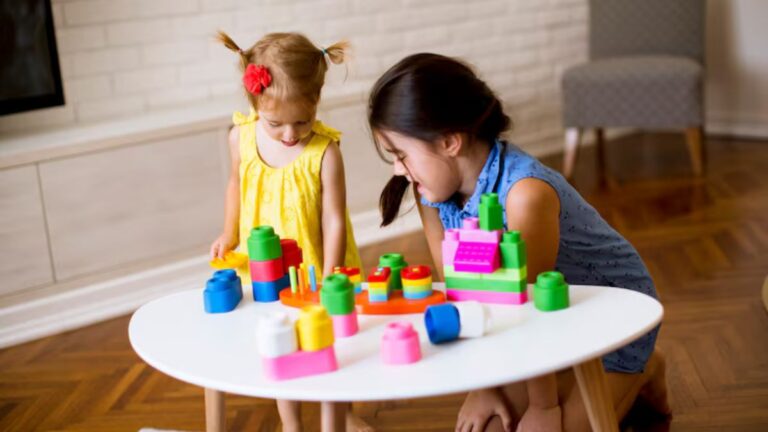Physical activity and gross motor development are critical aspects of preschool education in North Sydney. Besides simply keeping children engaged, these endeavours are essential to their general growth, influencing everything from their physical fitness to social and intellectual abilities. In this blog post, we’ll look at why physical activity is crucial for preschoolers, as well as how it helps them develop and acquire knowledge in an engaging and relevant way.
The Significance of Physical Activity in Early Childhood
Preschoolers are full of power and are always on the go, examining everything around them. Involving children in physical activity not only allows them to burn off extra energy but also encourages the growth of gross motor skills. These talents require the vast muscles of the body to be utilized in actions such as sprinting, jumping, climbing, and throwing. By promoting these exercises, children not only build their muscles but also enhance their control, equilibrium, and spatial perception.
Gross Motor Abilities Provide Cognitive Advantages
Gross motor abilities are essential for performing everyday duties and tasks. These abilities serve as a basis for numerous physical activities throughout life, from tying shoelaces to participating in sports. Developing gross motor abilities in childcare in Mascot helps them feel more confident and independent. For example, having the ability to run and jump securely enables kids to engage proactively in outdoor activities and group tasks, which promotes social relationships and collaboration.
Cognitive and Academic Influence
Admit it or not, physical activity promotes intellectual growth. When toddlers participate in tasks that involve cooperation and focus, like grasping a ball or negotiating a maze, they improve their capacity to concentrate and comply with directions. According to studies, consistent physical activity can boost children’s focus and willingness to study, laying a solid basis for successful learning as they advance through schooling.
Social and Psychological Advantages
Physical activities enable children to communicate with other children in a good and collaborative way. These conversations, whether they require taking rounds on the slide or enjoying tag, develop crucial interpersonal abilities such as sharing, compassion, and speech. Furthermore, physical play frequently entails surviving hurdles and failures, which promotes perseverance and emotional control in preschoolers.
Incorporating Physical Activity into the Preschool Curriculum
Physical activity may be included in preschoolers’ regular routines without becoming complex. Simple pastimes like swaying to music, playing with balls, or utilizing playground materials can be enjoyable and healthy. Several preschools in North Sydney incorporate scheduled outdoor activities or workouts to give children plenty of chances to stretch their bodies while building gross motor skills in an appropriate and monitored setting.
Motor Skill Development and Achievements
Recognizing the advancement of gross motor abilities may assist teachers and parents in tracking the growth of a kid. Preschoolers often begin with simple motions like crawling, walking, and running. As they mature, they perfect their abilities and learn more complicated actions like hopping, skipping, and grabbing a ball. Every achievement attained indicates not only physical development but also intellectual and neurological progress, as the brain integrates and improves motor actions.
Health and Wellness Advantages
Besides physical growth, consistent physical activity in preschoolers supports general health and well-being. It promotes bone and muscular strength, cardiac health, and weight maintenance. Forming healthy behaviours early in life prepares you for lasting physical wellness and lowers your chances of becoming obese and having other health problems later on.
Sensory Connection and Motor Guidance
Physical activities help children improve their sensory processing and cognitive organizing abilities. Holding on to a support structure, traversing an obstacle course, and interacting with tactile objects all excite distinct senses and teach toddlers how to manage their emotions effectively. This sensory-motor coordination is required for routine tasks, including dressing, eating, and writing.
Outdoor Activity and Nature Discovery
Outdoor playing is particularly good for children since it allows for free, creative thought and discovery. Natural environs foster imagination and interest, enabling youngsters to participate in tasks like digging in the sand, tree climbing, and investigating organic surfaces. Playing outside additionally introduces children to a variety of landscapes and sensory experiences, which benefits their general intellectual and physical growth.
Flexible Physical Education
Adaptive physical education (APE) is critical for kids with disabilities or unique needs because it ensures that they get adequate physical activities based on their skills. APE lessons aim to account for specific differences while also allowing every kid to engage in physical activity and play actively. These initiatives encourage participation, motor growth, and general health.
Cultural and Social Aspects
Physical activities at preschools can also mirror social norms and behaviours, encouraging children to be mindful of and appreciate their culture. Dance forms, standard games, and sports from numerous backgrounds can be introduced into the school’s curriculum, providing children with a varied range of encounters while also encouraging appreciation for cultural variety.
Family and Community involvement
Engaging families and communities in encouraging physical activity emphasizes its significance beyond the preschool context. Arranging family fitness programs, neighbourhood sports days, or outdoor playgroups promotes social interaction and enforces positive lifestyle choices. Partnering with local groups and fitness instructors may offer added tools and information to help youngsters enhance their physical skills.
Professional Growth for Instructors
Educators play an essential role in encouraging physical activity and motor growth in preschool environments. Continued training, as well as professional growth programs, can provide educators with the information and abilities needed to incorporate movement-based educational programs into their daily duties successfully. Instruction in child growth, motion tactics, and security regulations guarantees that physical activities are age-appropriate and helpful to all children.
Conclusion
In conclusion, physical activity and gross motor development are essential components of Mascot’s childcare. By engaging in active play, children not only strengthen their bodies but also enhance their cognitive, social, and emotional skills. Preschools and parents alike have a responsibility to create environments that support and encourage physical activity, ensuring that every child has the opportunity to thrive physically and academically.
